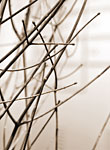Dutiful children, while sorting out attics and bureau drawers of departed mothers, maiden aunts, and grandmothers who came of age in the American South during the reconstruction period, could exchange stories of what they had found that the older women had chosen, with meticulous care, to save. The aluminum foil linings of cigarette packs, worn-out neckties, and any rag or scrap of sheet were common detritus. Frequent enough to assume the status of something akin to urban legend were the gathered, balled-up bits of twine, all marked “pieces of string too small to use.” For these women, assigning language and arranging storage were gestures of endurance.
These unlikely relics share curious kinship with the poems of Nick Lantz, this year’s winner of the Larry Levis Reading Prize. His collection of poems, We Don’t Know We Don’t Know, confronts the space where Donald Rumsfeld’s language for explaining government action seems to meet up not only with those balls of string but also with Beckett’s two tramps and the crew disgorged from the stateroom in A Night at the Opera. Anything and nothing can be an “unknown unknown.”
Lantz speaks as an advocate for words, for the survival of connection rather than the victory of abstraction. Just as bits of string take on weight as talismans of survival, so Lantz’s poems restore heft to language drained of specificity and punch.
Published here are three poems from Lantz’s collection, three new poems, an interview with the poet, a reading by the poet, and a review of the book by Gregory Kimbrell. They are a part of Levis Remembered, an annual reading loop that honors the life and work of the late Larry Levis. To revisit Levis’s own work, the poem “Elegy with an Angel at Its Gate” appears accompanied by four working drafts of the same poem. These drafts provide a glimpse of how Levis attacked the creation of a long poem and of how many of the images (horses, grasses, birds) and concerns (material history, personal history, loss) that shape all of the later poems titled as elegies find their echo here. Included in the Levis loop as well are images of additional pieces of Richmond street art that express an ongoing homage to the poems.
Lantz and Levis share houseroom in the continuum between private experience and history that defines the territory for Tom Sleigh’s exploration of the grief of poetry and the grievance of politics in work by Anna Akhmatova, Mahmoud Darwish, Jean Genet, and Tomas Tranströmer. His commentary on the poetry of Tranströmer continues the conversation about that poet’s work begun in v10n1.
Examining where the creative impulse assumes form and function provides the impetus for a closer look at how poems in sequence seem to be populating the landscape of verse. “Ocher” by David Wojahn, published in v9n2, engaged our interest in looking at this process more closely, and ten poets in this issue whose selected poems are excerpted from sequences have provided some description of their method or their motivation.
From Anita Felicelli’s fragmented conversation with the poems of Sappho to the created personae of Adam Day’s Badger and Douglas Jones’s Sexy poems, these variously constellated works take advantage of what Lisa Russ Spaar describes as “the opportunity that series and sequences afford the lyric poet to pitch interiority and transitory inkling against and into the tidal, temporal motions of narrative,” though each individual poet crosses the border of story at her/his own unique checkpoint.
In Nonfiction, interviews with Sara Vap, who allows a glimpse of the working poet as mother, and R.H.W. Dillard, who notes a few road signs to follow through poems that track, in part, a lifetime conversation with books, offer hints to where their poems get started. Randy Marshall’s review of Dillard’s What Is Owed the Dead extends this discussion.
Additionally in Poetry, Mark Jarman hoofs it, bad hips and all, from Port Angeles to Prague in search of the angels of our better natures, and Joy Katz itemizes the bill we are forced to split, eventually, with survival and sacrifice, here and hereafter, recognizing how “pain sings a continuum, a line we all hang our shirts on.” Jamal May reminds us that, despite its direst interrogations, the city’s crucible is transformed as it transforms us, how, mercifully, “there is space here for bones— / a ribcage, brimming like yours.”
Fiction highlights various stories that demonstrate how a writer’s deft hand can present character and voice in ways that demand attention and empathy. Bryn Chancellor’s wandering locksmith and Adrianne Harun’s lost girls, Wesley Gibson’s terrifying raccoon and Katherine Connor’s threatening big cat underline the perilous nature of even the most ordinary day. The totemic presences haunting this fiction, while not universally human, emblematize a universal human truth—that passion is a tricky experiment which often fails to yield the results we might expect. But, like Hannah Wood’s teenage William Shakespeare, who reintroduces Romeo and Juliet in an GCSE level science lab, we’re led, nonetheless, to deeper discoveries, in the gritty precipitates of sorrow and the volatile distillations of joy.
Gallery presentations skirt the wide swirl of discussion to challenge our apprehensions in an increasingly impersonal culture. David Roby looks to Tennessee Williams and The Glass Menagerie as he affirms the illusion of ongoing lives that a play can assign to even the most briefly mentioned Unseen Character. John Ravenal’s introduction to the work of Chinese artist Xu Bing emphasizes the fact that an artist’s preoccupations can exist simultaneously in the personal and in the global sweep of human culture, while Howard Risatti and Steven Glass document the ability of the handmade object to remind us of the resonance of things that come from someone and not someplace.
Rounding out the issue are a featured reading by novelist Jesmyn Ward and reviews of new books by Traci Brimhall, Anne Germanacos, Natasha Tretheway, Alison Stine, John Pursley III, Brian Teare, and Jake Adam York. These reviews provide further insight into writing and its echoes beyond the page. Be it a single, shuddering bat or hurricane, the work bears witness to the human reaction, measuring, as much as words can, its magnitude, still piecing together the salvage, assigning the name.Return to top menus | Browse issue












